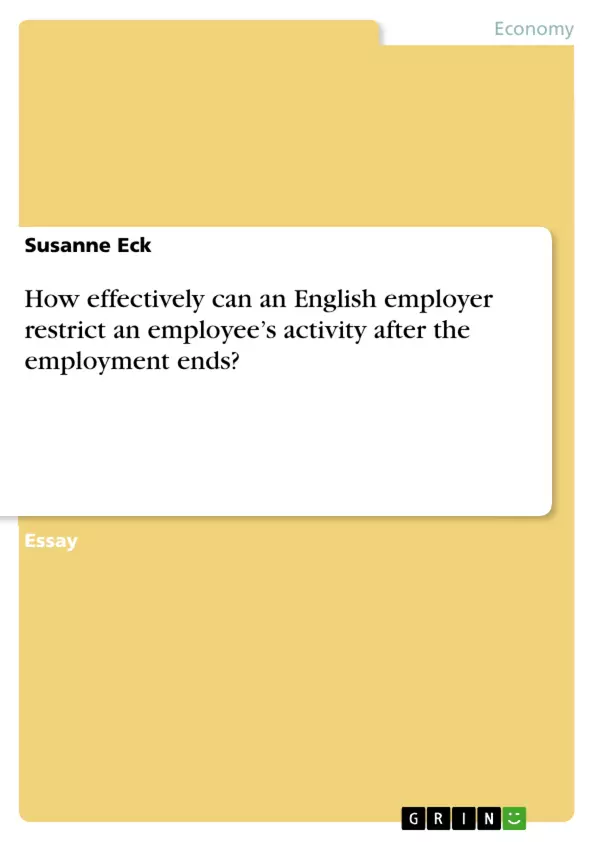If an employee change his emploeyer, there is the danger, that the ex-employee takes the company secrets and other interesting and confidential information with itself away to his new employer, who is very likely a competitor of the ex-employer or the ex-employee uses his knowledge to settle his own undertaking and than competes with his former employer.
So there is a big interest on the part of the ex-employer to restrict the possibilities of the Information transfer to the competitor by the ex-employee. It is arguable how and in which complexity it succeeds, in relation to English law and to European law. This should be illustrated in the following.
Inhaltsverzeichnis (Table of Contents)
- How effectively can an English employer restrict an employee's activity after the employment ends?
- Trade secrets
- Confidential information
- Trade connections
- Workforce
- Restraint of Competition
- Legitimate business interests
- Reasonable restriction
- Position of the employee
- European Law
- Free movement of labour
- Policy of competition
- German Law
Zielsetzung und Themenschwerpunkte (Objectives and Key Themes)
This essay examines the legal framework governing restrictions placed on employees' activities after their employment ends, focusing specifically on English law and its interaction with European law. The primary objective is to analyze how effectively English employers can restrict their former employees' actions to prevent the disclosure of confidential information or competition with the former employer.
- The legal mechanisms for protecting trade secrets, confidential information, trade connections, and workforce from ex-employees.
- The balance between an employer's legitimate business interests and the employee's right to pursue their career.
- The role of European law, particularly the free movement of labour and competition policy, in shaping the application of national restrictions.
- The importance of reasonableness in terms of geographical scope, duration, and the activities restricted.
- The need for careful consideration of the employee's position and the specific facts of each case.
Zusammenfassung der Kapitel (Chapter Summaries)
The essay begins by introducing the potential risks associated with former employees using their knowledge and contacts to benefit competitors or establish their own businesses. It then explores various types of information that employers may seek to protect, including trade secrets, confidential information, trade connections, and workforce skills.
The discussion then shifts to the legal framework for restricting competition, highlighting the importance of demonstrating legitimate business interests and ensuring the reasonableness of any restrictions imposed. The essay examines how courts balance the interests of employers and employees, considering factors such as the employee's position within the company, the geographical scope, and the duration of the restriction.
The essay concludes by analyzing the European law framework relevant to restrictions on employee activities, specifically addressing the free movement of labour and competition policy.
Schlüsselwörter (Keywords)
This essay focuses on the following key topics and concepts: restraint of competition, trade secrets, confidential information, trade connections, workforce, European law, free movement of labour, competition policy, legitimate business interests, reasonableness, and case law.
Frequently Asked Questions
Can an employer prevent an ex-employee from working for a competitor?
Under English law, employers can use post-termination restrictions, but they must be reasonable and protect a legitimate business interest to be enforceable.
What are considered "legitimate business interests"?
These include trade secrets, confidential information, trade connections (client relationships), and the stability of the workforce.
What makes a restriction "reasonable" in a contract?
Reasonableness is judged based on the duration of the restriction, the geographical scope, and the specific nature of the activities being restricted.
How does European Law affect these restrictions?
European law emphasizes the free movement of labour and competition policy, which can limit the extent to which national laws can restrict an individual's career path.
What is the difference between trade secrets and confidential information?
Trade secrets enjoy higher protection after employment ends, while general confidential information may only be protected if specific clauses are included in the contract.
Does the employee’s position matter in court cases?
Yes, courts are more likely to uphold restrictions on senior employees who have access to sensitive data than on junior staff with limited influence.
- Quote paper
- Susanne Eck (Author), 2009, How effectively can an English employer restrict an employee’s activity after the employment ends?, Munich, GRIN Verlag, https://www.grin.com/document/141955



